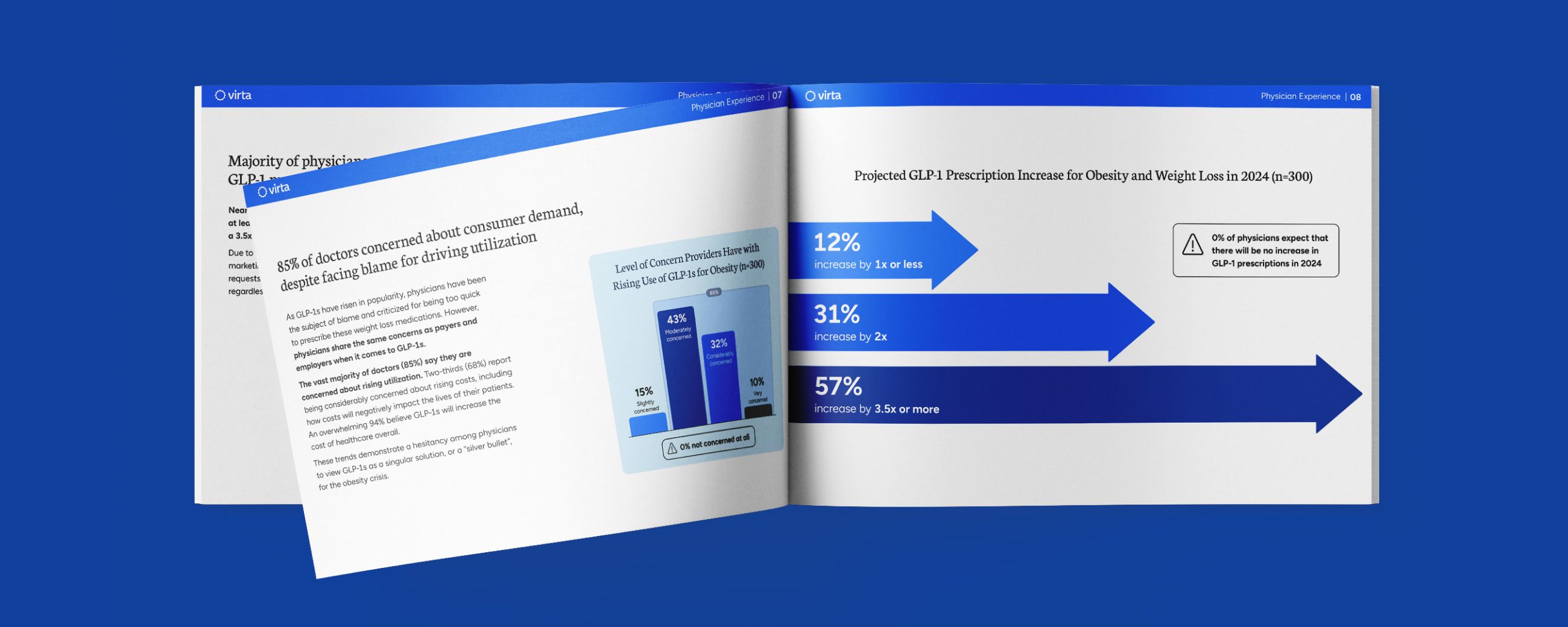
No-zempic? 64% of Americans Agree Popularity of Weight Loss Drugs is Bad for Body Positivity

Over two-thirds of Americans would rather lose weight on their own than with prescribed drugs, per Wakefield Research survey of 1,000 Americans
With the proliferation of GLP-1 drugs for weight loss across news and social media, it’s easy to presume everyone is either talking about GLP-1s, taking one, or wishing that they were. But is that really the case? Where does nutrition fit into the equation? In partnership with Wakefield Research, Virta Health, the leader in diabetes reversal and sustainable weight loss, conducted a survey of 1,000 nationally representative U.S. adults to understand attitudes on health, nutrition, and weight loss.
"Nutrition and weight management has always been a hot topic, but the popularity of weight loss drugs has changed the game. We wanted to gain a deeper understanding of how GLP-1s have impacted Americans’ perception on issues like body image, healthy eating, and weight loss,” said Catherine Metzgar, PhD, RD, and health coach at Virta.
Our top findings below, and detailed in the corresponding report, Virta Vitals: Taking America’s Pulse on Nutrition and Weight Management.
Bad for Body Image
As celebrities and social media influencers boast about their Ozempic journeys, the majority of Americans (64%) agree this focus has negatively affected the body positivity movement, including 72% of Gen Z respondents.
“People are struggling with the idea of body positivity, as every celebrity and TikTok star is suddenly 30 pounds lighter,” said Metzgar. “I’ve seen this reflected in the day-to-day reality of many members I work with.”
The cultural focus on Ozempic and other weight loss drugs may also be negatively impacting Americans’ summer plans:
- Nearly half (45%) of those surveyed feel their weight prevents them from fully enjoying activities like going to the beach, air travel, or participating in sports
- That number jumps to 73% of those with obesity (vs. 33% of those without obesity)
That said, for many Americans, looking good may be less important than feeling good: slightly more adults want to lose weight to increase their energy (66%) over improving their appearance (63%). This is even more important for Boomers, as 76% say more energy is a top factor. Appearance is still top of mind for women though—69% chose it as a top motivator vs. 56% of men.
Losing Weight the Old Fashioned Way
Over half (57%) of Americans agree that weight loss medications are dominating conversations about health—ahead of fitness and exercise, nutrition, and traditional calorie counting. More than 2 in 10 (21%) know someone who is currently on a GLP-1 weight loss drug, and 13% “suspect” someone they know is taking one.
Yet, the majority of Americans aren’t sold on actually using weight loss drugs. Over two-thirds (69%) of those surveyed would rather lose weight on their own, including more than half of those with obesity. Additionally, a whopping 84% of Americans have at least one concern about GLP-1 medications. The top reasons stopping people from considering them—even with a doctor’s recommendation—are:
- Cost, with 54% saying the expense—up to $1300 per month—takes them off the table
- Side effects, such as nausea, stomach issues, or muscle loss (54%)
- Side effects that cause changes in appearance such as a hollowed face and jowls (“Ozempic face”) (38%)
- Needing to be on the drugs for life to sustain weight loss (35%)
- Taking a GLP-1 won’t help them learn sustainable eating habits (33%)
Despite these concerns, more than one in five Americans (21%) are either using a GLP-1 drug currently, have used one in the past, or have had a doctor recommend one. Another 18% of Americans have considered one. Interestingly, men are nearly twice as likely to have been recommended a GLP-1 than women.
Life After Ozempic
When it comes to what to do after getting off a GLP-1, many Americans aren’t thinking long-term.
- 30% would figure it out and plan as they go
- 8% would only think about it if they were to stop the medication
- Just 8% would plan to take a GLP-1 for life
Yet, without an effective offramp plan in place, numerous studies have shown that most patients cannot sustain weight loss after getting off of GLP-1 medications.
The Parents Are Not Alright
American parents are busier than ever, so it’s no surprise many are struggling with their health. When compared to non-parents, parents are:
- Twice as likely to say lack of time is a top barrier to healthy eating (42% vs 22%)
- More likely to be tricked by nutrition labels into believing its contents are healthier than they are (90% vs 71%)
- Nearly twice as likely to have considered a GLP-1 for weight loss (25% vs 15%)
- Much more likely to want to use a weight loss medication to lose weight vs. habit and behavior modification, like diet and exercise (41% vs. 25%)
Parents’ body positivity and energy levels may be suffering as well. Almost 6 in 10 parents (58%) believe their weight prevents them from fully enjoying summer plans, much more than non-parents (38%).
Fooled by Food Labels
More than 1 in 5 Americans (21%) feel their health has declined in the last year, jumping to over 1 in 3 (35%) for those with obesity. Nutrition is a key component of health, and yet high-quality, whole foods are not accessible to many. In fact, 85% of Americans report some barrier to healthy eating, with obstacles including:
- Cost of healthy food (49%)
- Lack of motivation (42%)
- Temptation at work and in social situations (42%)
- Lack of time to prepare a healthy meal (29%)
One in five listed conflicting information about what is healthy as a top barrier. It’s no surprise that a strong majority (77%) have been “tricked” by food packaging promoting health or nutritional benefits, only to find out later the product was not as healthy as they initially believed.
Many Americans may understand that processed foods are less healthy than fresh, whole foods, but that doesn’t stop us from eating them. Nearly all respondents (94%) report some processed foods in their diet. Gen Z and Millennials reported the highest amounts of processed foods in their diet (~45% on average), compared to 35% for Boomers.
The majority of Americans also ignore the FDA’s nutrition recommendations. 85% either don’t use them to guide their dietary decisions or aren’t familiar with FDA’s MyPlate guidelines (formerly known as the food pyramid).
Says Metzgar, “Given the volume of (mis)information, Americans are confused about nutrition and healthy eating. They want to change their habits, but don’t know where to start. We need to make it easier to help people understand the best things to eat for their body, and not just default to medications.
“As manufacturers work to cut costs and develop an oral version of GLP-1 drugs, they’ll likely become even more prevalent. It’s crucial to continue offering accessible, nutrition-first alternatives to weight loss drugs, and ways to help those on GLP-1s get off the drugs without regaining the weight.”
Methodology
The Virta Health Survey was conducted by Wakefield Research among 1,000 nationally representative US adults aged 18+, between July 11th and July 15th, 2024, using an email invitation and an online survey. Data has been weighted. Results of any sample are subject to sampling variation. The magnitude of the variation is measurable and is affected by the number of interviews and the level of the percentages expressing the results. For the interviews conducted in this particular study, the chances are 95 in 100 that a survey result does not vary, plus or minus, by more than 3.1 percentage points from the result that would be obtained if interviews had been conducted with all persons in the universe represented by the sample.
This blog is intended for informational purposes only and is not meant to be a substitute for professional medical advice, diagnosis, or treatment. Always seek the advice of your physician or other qualified health provider with any questions you may have regarding a medical condition or any advice relating to your health. View full disclaimer
Are you living with type 2 diabetes, prediabetes, or unwanted weight?





.jpg)


